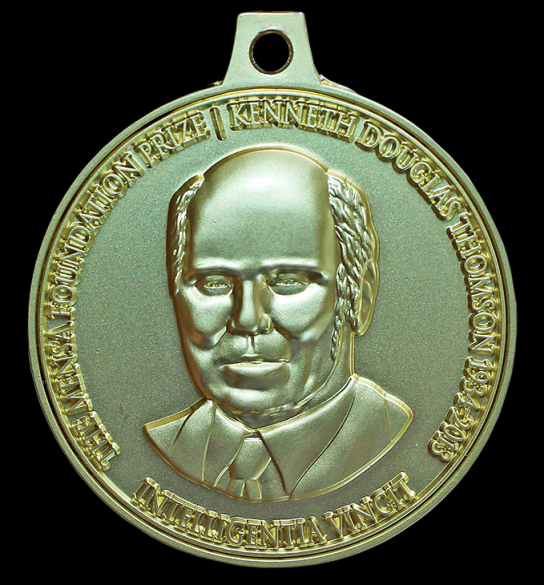Trending...
- Bonelli Systems Expands Managed IT Services Nationwide, Leveraging Microsoft Azure Expertise
- Governor Polis Sign Bills into Law Expanding Support Services and Increasing Safety in Colorado Schools
- xREnergy up as much as +3,094,634% on first day listed on the XRP Ledger. Ticker : $XRE
Dr. R. Douglas Fields is a pioneer on nervous system development, plasticity, memory
HURST, Texas - ColoradoDesk -- R. Douglas Fields, Ph.D., a neuroscientist and author of numerous books and magazine articles about the brain, has been awarded the fourth Mensa Foundation Prize for his research in plasticity and active myelination in brains related to learning and intelligence.
The biennial Mensa Foundation Prize honors the best discoveries in intelligence and creativity and is endowed by the estate of Kenneth Douglas Thomson (1934-2013), a longtime Mensa member. The award, which includes a $10,000 award, will be presented at American Mensa's Annual Gathering, July 5-9, in Baltimore, and Dr. Fields will give a presentation on his work.
Dr. Fields' long-standing research interest is in how functional activity influences nervous system development and plasticity along with the cellular mechanisms of memory. He is recognized internationally for his research on glia, which are brain cells that communicate without electricity, and for his pioneering discoveries on a new cellular mechanism of learning involving glial cells that form myelin. Myelin is the electrical insulation on nerve fibers, which speeds transmission of neural impulses. Dr. Fields' research shows that the glial cells forming myelin can sense neural impulse activity and that they contribute to learning and memory by changing the speed of neural impulse transmission to optimize the synchrony of information arriving at relay points in neural networks.
More on Colorado Desk
"I am especially gratified by my research on how myelin contributes to learning," Dr. Fields said, "because it overturns long-standing dogma about myelin — that it is static electrical insulation — and because it is a complete departure from how neuroscientists have thought about the mechanisms of learning and memory being based only on modifying synapses."
The Mensa Foundation Prize Committee praised the impressive scientific detail of Dr. Fields' work and his creative point of view. "Each small component of the rather complex glial model is backed by numerous rigorous multidisciplinary experiments involving imaging, chemistry, actual measurement of nerve conduction speed, and correlated animal learning experiments," said Dr. Susan Stine, Mensa Foundation Prize Committee member. "I think the sheer body of work and the observations using multiple experimental designs is amazing."
Joining Dr. Stine on the Mensa Foundation Prize Committee are:
Dr. Fields is Chief of the Nervous System Development and Plasticity Section at the National Institutes of Health, an American Association for the Advancement of Science Fellow, and University of Maryland adjunct professor. He received advanced degrees at U.C. Berkeley, San Jose State University, and U.C. San Diego and was a postdoctoral fellow at Stanford and Yale universities and at the NIH prior to starting his own NIH lab in 1994.
More on Colorado Desk
Outside the lab, he writes about science for Scientific American, Quanta, Outside Magazine, Huffington Post, Undark Magazine, Psychology Today, and many others. His neuroscience research has been featured on national television, radio, NPR, the National Geographic, and other media, and he speaks about neuroscience for the general public on NPR, World Science Festival, TEDex, Google Talks, and others.
The first Mensa Foundation Prize was awarded in 2017 to Dr. David Silver, who led Google's efforts to develop the first computer program to defeat the world's best Go players. In 2019 neuroscientist Dr. Aron K. Barbey was recognized for significantly advancing the neuroscience of brain connectivity with his innovative research applying functional magnetic resonance imaging to the mapping of brain lesions and measuring their effects on raw intelligence. And in 2021, statistical geneticist Dr. Danielle Posthuma of the Netherlands was awarded the third Mensa Foundation Prize for her research directly identifying, for the first time, hundreds of human genes highly correlated to variations in intelligence.
"This award is such a great honor," Dr. Fields said, "because it comes from a group of people from all walks of life in an organization that values and supports science and creativity for the simple reason that human beings are deeply curious about the natural world and driven to explore and understand it."
The biennial Mensa Foundation Prize honors the best discoveries in intelligence and creativity and is endowed by the estate of Kenneth Douglas Thomson (1934-2013), a longtime Mensa member. The award, which includes a $10,000 award, will be presented at American Mensa's Annual Gathering, July 5-9, in Baltimore, and Dr. Fields will give a presentation on his work.
Dr. Fields' long-standing research interest is in how functional activity influences nervous system development and plasticity along with the cellular mechanisms of memory. He is recognized internationally for his research on glia, which are brain cells that communicate without electricity, and for his pioneering discoveries on a new cellular mechanism of learning involving glial cells that form myelin. Myelin is the electrical insulation on nerve fibers, which speeds transmission of neural impulses. Dr. Fields' research shows that the glial cells forming myelin can sense neural impulse activity and that they contribute to learning and memory by changing the speed of neural impulse transmission to optimize the synchrony of information arriving at relay points in neural networks.
More on Colorado Desk
- Fairmint Introduces First Fully Onchain and Open Cap Table Infrastructure
- Vortex Brands Begins Gold Purchases Under New Joint Venture with Dubai-Based Partner
- Colorado Springs: Fishers Canyon Open Space Master and Management Plan approved
- NBA Champion Lamar Odom Launches Anti-Addiction Meme Coin, Ushering in a Disruptive Innovation in Web3
- Delivering Real Results for Colorado: Gov. Polis Signs Landmark Housing Bill Into Law, Celebrates Actions for Coloradans on Education, Housing, Public Safety
"I am especially gratified by my research on how myelin contributes to learning," Dr. Fields said, "because it overturns long-standing dogma about myelin — that it is static electrical insulation — and because it is a complete departure from how neuroscientists have thought about the mechanisms of learning and memory being based only on modifying synapses."
The Mensa Foundation Prize Committee praised the impressive scientific detail of Dr. Fields' work and his creative point of view. "Each small component of the rather complex glial model is backed by numerous rigorous multidisciplinary experiments involving imaging, chemistry, actual measurement of nerve conduction speed, and correlated animal learning experiments," said Dr. Susan Stine, Mensa Foundation Prize Committee member. "I think the sheer body of work and the observations using multiple experimental designs is amazing."
Joining Dr. Stine on the Mensa Foundation Prize Committee are:
- Dr. Harry Ringermacher, Ph.D., physics, the committee chair and a Mensa member.
- Dr. Ivar Giaever, Ph.D., physics, microbiologist, and winner of the 1973 Nobel Prize in Physics.
- Dr. Steven Maranz, Ph.D., plant science, microbiologist, and a Mensa member.
- Judith A. Keating, CPA, TCE-IRS, and a Mensa member.
Dr. Fields is Chief of the Nervous System Development and Plasticity Section at the National Institutes of Health, an American Association for the Advancement of Science Fellow, and University of Maryland adjunct professor. He received advanced degrees at U.C. Berkeley, San Jose State University, and U.C. San Diego and was a postdoctoral fellow at Stanford and Yale universities and at the NIH prior to starting his own NIH lab in 1994.
More on Colorado Desk
- Colorado: Governor Polis Congratulates New Pope & Catholic Church
- Aureli Construction Sets the Standard for Seamless Home Additions in Greater Boston
- Colorado Springs: Jessie Kimber inducted as Fort Carson Good Neighbor
- ScreenPoints Puts Film Investors in the Credits—and in the Money With New FinTech Platform
- Pathways to Adulthood Conference May 17 at Melville Marriott Honoring NYS Assembly Member Jodi Giglio, Suffolk County Legislator Nick Caracappa
Outside the lab, he writes about science for Scientific American, Quanta, Outside Magazine, Huffington Post, Undark Magazine, Psychology Today, and many others. His neuroscience research has been featured on national television, radio, NPR, the National Geographic, and other media, and he speaks about neuroscience for the general public on NPR, World Science Festival, TEDex, Google Talks, and others.
The first Mensa Foundation Prize was awarded in 2017 to Dr. David Silver, who led Google's efforts to develop the first computer program to defeat the world's best Go players. In 2019 neuroscientist Dr. Aron K. Barbey was recognized for significantly advancing the neuroscience of brain connectivity with his innovative research applying functional magnetic resonance imaging to the mapping of brain lesions and measuring their effects on raw intelligence. And in 2021, statistical geneticist Dr. Danielle Posthuma of the Netherlands was awarded the third Mensa Foundation Prize for her research directly identifying, for the first time, hundreds of human genes highly correlated to variations in intelligence.
"This award is such a great honor," Dr. Fields said, "because it comes from a group of people from all walks of life in an organization that values and supports science and creativity for the simple reason that human beings are deeply curious about the natural world and driven to explore and understand it."
Source: Mensa Foundation
Filed Under: Health
0 Comments
Latest on Colorado Desk
- $56.7 Million Announced in Q1 2025 with Revenue Growth and Progress Toward NASDAQ Uplisting for AI Marketing Company: IQSTEL, Inc. Stock Symbol: IQSTD
- SAVVY MINING raised $500 million and launched BTC.XRP.DOGE cloud mining, increasing investors' returns by 30%
- New National Nonprofit Launches to Capture Firsthand Accounts of Adoption Stories
- The Tide Project Opens at Biennale Architettura 2025 in Venice Amplifying Youth Voices
- Wall Street analysts say BTC.XRP.DOGE cloud mining company SIX MINING is expected to achieve a 5-fold increase, allowing users to easily mine BTC
- Gen X Takes The Reins: New Book Guides Caregivers Juggling Parents, Kids, And Grandkids With Humor And Heart
- Fray Fitness Launches Memorial Day Sale and Veteran Organization Giveaway
- Shareholder Alert: Robbins LLP Informs Investors of the Civitas Resources, Inc. Class Action Lawsuit
- Free Peer Recovery Coaching Now Available for Rocky Mountain Health Plan Members Across Colorado
- ABM for Good™ Launches First Project with Build Change
- Colorado Tourism Office Celebrates 2025 National Travel & Tourism Week
- ImagineX, in Collaboration with Qualys, Launches New mROC Services to Transform Enterprise Cyber Risk Management
- Ditch Micromanagement: New Leadership Book for Results-Driven, Accountability-Based Teams
- Jay Tapp was named Managing Director in British Columbia
- State Launches Colorado Property Tax Map as a Central Source to Understand Taxing Jurisdictions and Property Tax Rates
- Hubei Heavy Equipment Makes a Striking Appearance at CIMT and Competes with International Brands
- 20 Patents Issued Worldwide, Cementing Company Leadership. First Ever Cable-Free 12-Lead ECG: HeartBeam, Inc. (Stock Symbol: BEAT)
- NASDAQ Uplisting for Higher Market Exposure and Wide Corporate Benefits to AI Boosted Marketing Company On Track Towards $1 Billion Revenue by 2027
- Congressional Men's Health Caucus Shows Bipartisan Consensus and Focus on Prevention, Mental Health, and Closing the Lifespan Gap
- DuoKey, Axiomtek and Blue Edge Network Partner to Enhance Smart Cities with Privacy-Preserving Urban Safeguarding and Fleet Management


